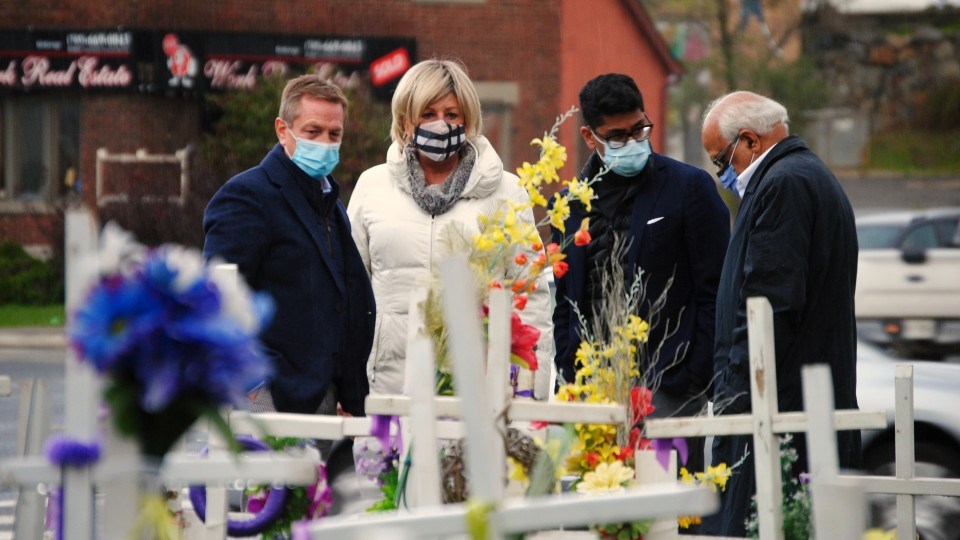After hammering in five more white crosses earlier today, Denise Sandul now counts 214 memorials set up at the corner of Paris and Brady streets in downtown Sudbury.
There are more to come, she said, noting she recently received a request for a cross from the family of someone who died by overdose on Oct. 21.
“There hasn’t been much change in regards to the number of people we’re losing,” she said of the steady stream of people dying by overdose these past several months. “This is a generation of people who are loved and missed.”
Sandul started the Crosses for Change memorial site for people who died by overdose last year after sitting in the depths of grief over the death of her son, Myles Keaney, for seven weeks.
Keaney died at the age of 22 as the result of an accidental drug overdose downtown on Sept. 8, 2020.
What started out as the installation of a lone cross and a social media callout for others to sign up for crosses to help draw attention to the opioid epidemic has grown exponentially.
“Prior to the crosses, people were not talking about the opioid crisis,” Sandul said, adding that public dialogue around the time of her son’s death was all about COVID-19.
Now, she said there’s a greater acceptance of the community’s homeless population alongside an acknowledgement that Greater Sudbury is contending with a serious drug problem.
“I can’t talk to anyone in this community without them telling me they have a child, they’re waiting for their child to die, they know someone, they have a relative,” she said. “It’s personal, and this kind of opens up for people to share.”
Earlier today, Sandul met with local media alongside Ontario Medical Association president Adam Kassam and CEO Allan O’Dette and Sudbury and District Medical Association president Dr. Rayudu Koka to further this advocacy.
“It’s gripping our society from coast to coast to coast,” Kassam told journalists gathered at the Crosses for Hope site. “COVID has only deepened that fracture within our system.”
The Ontario Medical Association is publicly releasing its Prescription for Northern Ontario in Greater Sudbury on Monday and will release their full five-pillar plan for the province the following day in Toronto.
One of these pillars, Kassam said, is the mental health and addictions crisis, which has been exacerbated in rural and northern communities in part due to limited service availability.
Greater Sudbury alone, for example, is short 40 psychiatrists, 100 family doctors and 130 specialists, he said, adding, “Just from a frank health human resource perspective, this is a huge issue.”
The Ontario Medical Association plans on hosting a roundtable with local medical professionals and stakeholders on Monday to help guide future activities, which today’s meeting with Sandul also contributed toward.
The display of crosses sends a strong message, Kassam said, thanking Sandul and the friends and family of all 214 victims of overdose and counting for lending their stories toward public advocacy.
“These are brothers and sisters, moms and dads, cousins, friends, family members,” he said of the names written on the white crosses.
“The impacts of this public health crisis on communities such as Sudbury is such an important thing to not only recognize but ultimately do something about.”
For her part, Sandul said that her chief piece of advocacy is for assistive housing to help get people off the streets and supported by whatever they require to remain housed and healthy.
“If we get someone coming off the street we need help getting them set up,” she said, adding that you can’t just drop homeless people in an apartment and expect them to succeed.
Mental health and addictions is something local health professionals deal with on a daily basis, Koka said, adding that while some progress has been made in recent months, more needs to be done.
This, he said, is why it’s positive to see the Ontario Medical Association stop by Greater Sudbury to learn more about what’s going on locally so they can better advocate on their behalf.
“It’s good to get pressure from them, support from them for the government,” he said, adding that he’ll be joining other local health professionals and stakeholders by participating in today’s roundtable discussion.
“We definitely need services, and we’ll wait and see what launches tomorrow,” Sandul said. “I’m sure that this is a step in the right direction, and I myself am anxious for change.”
Tyler Clarke covers city hall and political affairs for Sudbury.com.
